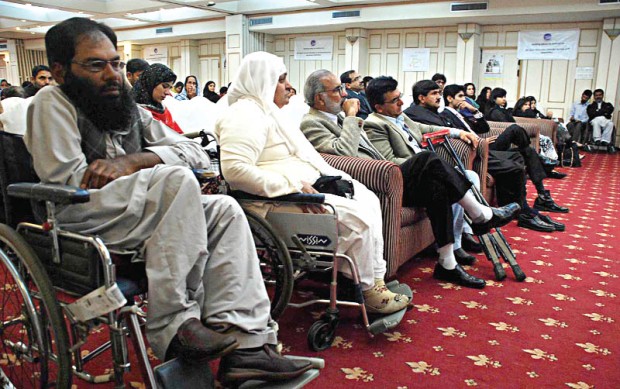The former Sunday Times sports writer, Simon Barnes, has written this about political correctness in Britain. For a writer in such a right-wing magazine, he is surprisingly approving. His son has Down’s Syndrome, which makes his shift in beliefs understandable. Reading this made me think.
Among the surprising things about living in Pakistan is the attitude to disabled people. In my very first visit, I stayed at a medical campus, in Lahore – don’t ask, it’s a long story.
The facilities for students seemed rudimentary at the time, but there was a fruit shop that sold fruit shakes, juices and anything else that contained the word ‘fruit’. Placed under some trees, on a patch of waste ground, it felt idyllic. Inspite of being near an expressway and on a busy campus site, anyone could have sat there and watched the world trundle by.
One of the guys working there had a problem. One of his hands was a stump, missing all the fingers and thumb. The guy used it to carry glasses and balance trays of drinks. He never broke anything, the whole time I was there.

The point I want to make is that nobody dwelt on his disability. Nobody patted his boss on the head saying, ‘you’re so generous employing that man’. He was accepted as just another guy working at the fruit shop. Everyone just got on with it.
In that same stay, I found myself on the sleeper train between Lahore and Karachi, heading for a job interview in that giantopolis. This train was fairly new (at the time), it was clean, reliable and punctual, if somewhat spartan. That was a step up from British trains which often felt little better than an excuse mill, apologizing for their very existence. Even the excuses felt like excuses for excuses – we apologise for being late because the previous service was late.
Riding this train in Pakistan was such a contrast.
The steward on this sleeper had a problem. He was deaf and unable to speak. Fairly profound for a customer facing worker. Not here. He communicated in his own sign language, we pointed to what we wanted on the menu and made hand gestures for the number of dishes, drinks and so on. He too made gestures, a bit like a magician trying to trick the eye, to confirm the orders and off he went.
I presume he was experienced because he was efficient and reliable. The communication problem only meant finding other ways to generate understanding. Again, nobody looked twice.
That’s not strictly true. This was my first time in Pakistan, and I was astonished that a disabled man would be employed, let alone without some kind of fanfare from passengers or company. Once again, everyone just got on with it.
It’s easy for someone in Britain to be sniffy about a country like Pakistan, in terms of its treatment of disabled people. It can’t be called ‘disabled friendly’. There are steps everywhere and lifts frequently don’t work, that’s if the riff-raff, i.e. regular service users, can be allowed to use them. There are occasionally ramps for wheelchairs and mobility impaired people, but a carabine, climbing boots and ice axe are necessary to climb them.
Worse still are the numbers of people used by criminals as a source of income in begging rings. Many of the victims are often deliberately maimed to make them more…productive, something touched on by Slumdog Millionaire. It should be said, this is not only a problem in South Asia
Here’s the rub. I have never heard of people with disabilities being the subject of hate crimes and accusations of malingering, swinging the lead and so on that emanate from British media and politicians. Nor have I come across the kind of patronizing, self-congratulation that everyone produces when disabled people are allowed to work.
Life in Pakistan may be more hazardous and tenuous than in Britain (at least, until David Cameron became Prime Minister) and yet the general attitude toward them is healthier in Pakistan than in Britain.